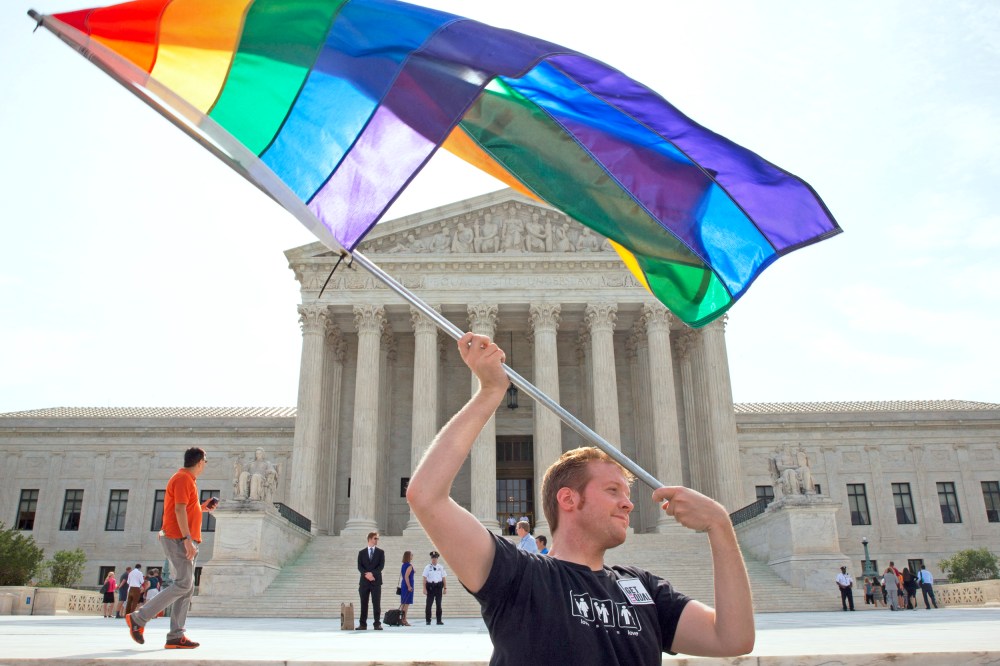Thursday’s final passage of the Respect for Marriage Act reveals a small but important fissure in the Republican Party’s long alliance with the Christian right. The GOP backers — 39 in the House and 12 in the Senate — recognize that nearly three-quarters of Americans support marriage equality, and only a narrow minority, primarily white evangelicals, opposes it. These 51 Republicans (though still less than a quarter of the caucus) rejected false and apocalyptic claims by influential Christian right leaders that the bill would abandon religious Americans to a “woke” agenda and eviscerate their religious freedom — claims they persisted in making even after senators added expansive religious liberty protections based on their demands.
Republican backers of the Respect for Marriage Act have been in the Christian right’s crosshairs since its initial passage in the House this summer. Tony Perkins, president of the Family Research Council, one of the Christian right’s most influential political organizations, called it the “Disrespect for Marriage Act” and charged that the Republicans supporting it had “caved to the Left’s pressure.” The FRC’s political arm, FRC Action — along with other right-wing advocacy groups like the Heritage Foundation, Concerned Women for America Legislative Action Committee and the American Family Association — then turned to pressuring Senate Republicans. The AFA claimed, for example, that religious nonprofits could be subject to lawsuits and revocations of their tax exemptions. The FRC argued that the bill would “tacitly vilify millions of Americans who believe in natural marriage.” Heritage charged that the bill is “about imposing the radical left’s sexual ideology as state orthodoxy.”
These 51 Republicans (though still less than a quarter of the caucus) rejected false and apocalyptic claims by influential Christian right leaders.
It goes almost without saying that the bill does nothing of the sort. Rather, it merely provides some protections for same-sex couples in the event the Supreme Court overturns its landmark 2015 decision in Obergefell v. Hodges, which struck down state bans on same-sex marriage as unconstitutional. In the Dobbs decision earlier this year overturning the constitutional right to an abortion, Justice Clarence Thomas suggested that LGBTQ rights could be one of the next targets for reversal.
The Respect for Marriage Act does not codify Obergefell, unfortunately, but it does guarantee same-sex couples federal benefits, and in a possible post-Obergefell world, it would require a state banning same-sex marriage to recognize marriages from other states. Last month, a bipartisan group of senators announced changes that directly responded to the Christian right’s complaints, including ensuring that nonprofit religious organizations would not be required to provide goods or services for a marriage celebration and that their position on marriage would not affect their tax exemption or other federal benefits such as federal funding or contracts.

Yet despite having been crafted specifically to address their concerns, this new language failed to satisfy top Christian right leaders, who persisted in portraying the legislation as a near existential threat. The Heritage Foundation claimed that the bill was poised to put “a giant target on the back of individuals, nonprofit organizations, adoption agencies, schools, and businesses that hold fast to the truth about marriage,” while setting “a national policy for same-sex marriage that would declare open season on people of faith.” FRC Action told its supporters in an email that the Senate “will paint a bullseye on the backs of concerned parents and people of faith” and expose people who “do not bow the knee to the LGBT agenda” to harassing lawsuits.











